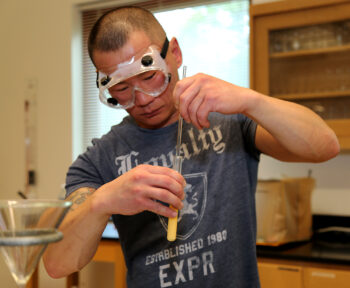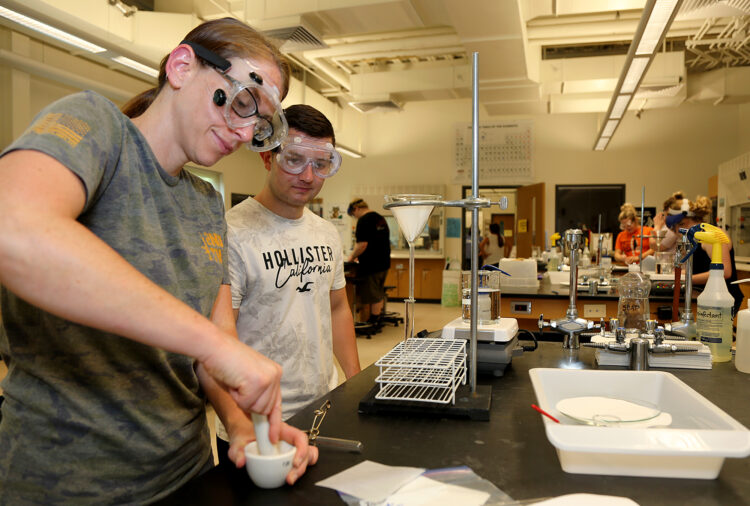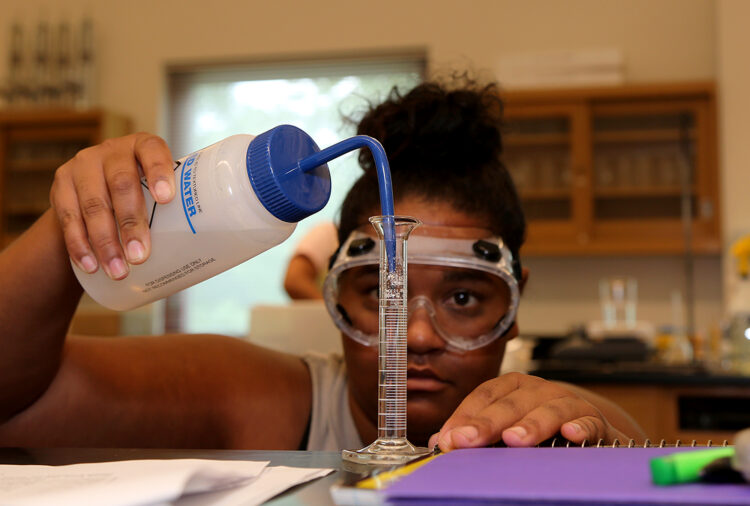(Butler, PA) Butler County Community College’s three new programs this fall are within its Science, Technology, Engineering and Mathematics division and include two intended to lead to a doctor of pharmacy degree from Duquesne University.
Expanded Duquesne University-track programs in biological science and in chemistry will join existing BC3 transfer programs in biological science and in chemistry and bring BC3’s associate degree selections in STEM in the 2022-2023 academic year to 15.
A new electronics technology program increases BC3’s certificate or workplace certificate options in STEM to six.
BC3’s existing transfer programs in biological science and in chemistry include required courses in chemistry I and II, organic chemistry I and II, and principles of biology I.
The college’s expanded programs add calculus and analytical geometry I, and physics I, to create a 64-credit Duquesne University-track biological science curriculum, and elementary statistics and principles of biology II to create a 65-credit Duquesne University-track chemistry curriculum.
Duquesne University each year will reserve seats for two BC3 students whom Duquesne accepts to enter the four-year professional phase of the doctor of pharmacy program, said Jason Stack, director of recruitment and admissions for Duquesne University’s school of pharmacy.
“BC3 has a great reputation”
“It’s advantageous for a student who is going to attend Butler County Community College because it’s a seamless transition,” Stack said. “BC3 has a great reputation with academic standards. A student can go to BC3 and take two years of the science and math courses that they need to move right into our pharmacy program.”

Approximately 800 students are enrolled in Duquesne University’s six-year program leading to a doctor of pharmacy degree, and 145 graduated in the Class of 2022, Stack said.
Tuition and fees for BC3 students from Butler County taking 15 in-person credits this fall are $2,655 and for BC3 students from other Pennsylvania counties, $4,200.
“It is a much lower cost option and it can still get you a pathway,” said Matt Kovac, BC3’s dean of STEM. “For someone who is inclined and interested in Duquesne’s pharmacy program and wanting to save money in the first two years, this is an excellent opportunity.”
Added Stack: “I can guarantee that BC3 is less expensive for the first two years.”
"For someone who is inclined and interested in Duquesne’s pharmacy program and wanting to save money in the first two years, this is an excellent opportunity.”
Matt Kovac, BC3's dean of STEM
Geriatric, infectious disease, nuclear, oncological, pediatric and veterinary pharmacy join community retail among the approximately 18 different pharmacist career pathways, Stack said. There are approximately 7,000 living graduates of the university’s school of pharmacy, Stack said.
“We have such a strong brand that employers are always looking for our graduates,” Stack said. “We have a 99.9 percent placement rate, so you’re almost 100 percent guaranteed to get a job as a pharmacist once you graduate. That’s why so many students join our program, because they get that peace of mind.”
The median pay for pharmacists in 2021, according to U.S. Department of Labor’s Bureau of Labor Statistics, was $128,570 per year.
Report: Retirement risk high
The retirement risk is high for pharmacists in Armstrong, Butler, Jefferson, Lawrence and Mercer counties for 2022-2023, according to an occupation overview from Emsi, an Idaho research company that conducts economic impact analyses for educational institutions.
There are 154 pharmacists in Armstrong, Butler, Jefferson, Lawrence and Mercer counties who are age 55 or older, according to Emsi. The national average for those ages 55 or older in an area the size of the five counties is 124, according to Emsi.
Pharmacists dispense prescription medications to patients and offer expertise in the safe use of prescriptions, according to the Bureau of Labor Statistics.
BC3’s existing program in biological science requires a minimum of 61 credits and in chemistry, 63 credits.

"We have a 99.9 percent placement rate, so you’re almost 100 percent guaranteed to get a job as a pharmacist once you graduate."
Jason Stack, director of recruitment and admissions, Duquesne University's school of pharmacy
New BC3 workplace certificate 26 credits
BC3 will also launch this fall a 26-credit electronics technology workplace certificate that provides foundational electronics technical skills. The curriculum includes courses taken by electronics apprentices from area manufacturers each year, Kovac said.
Students can acquire skills in alternating- and direct-current electronics, digital electronics, introductory transistor and nonlinear electronics, mathematics and power systems, Kovac said.
In addition to training electronics apprentices in their own programs, Kovac said, area manufacturers have sent workers to BC3 for credit courses in digital electronics, electrical fundamentals, electronics I and industrial electricity and maintenance.
Area manufacturers have also sent workers to BC3 for noncredit courses that include physics, industrial communications, industrial math and computer basics, according to Kathy Strobel, coordinator of business training in the college’s Workforce Development division.
Courses in BC3’s electronics technology workplace certificate include college algebra or technical mathematics I; digital electronics, electrical fundamentals, electronics I; and power systems and maintenance or industrial electricity and maintenance.
“This core set of courses in and of itself has merit in industry,” Kovac said. “This would allow a student to be considered for positions that involved technical aspects of working with electronics. And they also stack into our associate degree programs.”
Courses can be applied to BC3’s 63-credit electronics technology career program or to its 60-credit electronics technology-occupational track career program.
BC3’s fall 2022 semester begins Aug. 22.
For additional information, visit bc3.edu/stem.





